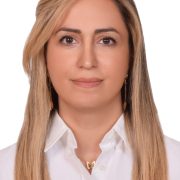Afsaneh Karami
Research Interests
Agri-Robotics, Robot Vision, Selective harvesting robotics
Posters
- Training strategies for domain generalisation in object detection for autonomous driving @ The Towards Autonomous Robots and Systems (TAROS) Conference 2023 / CDT Annual Conference / Joint Robotics CDT Conference (September 2023)
About me
I got my bachelor’s and master’s degrees in biosystems engineering. I like programming and I have programming experience with C++, Python, and MATLAB. I learned deep learning by taking online courses from Stanford University and also by self-studying.
Before joining the CDT, I worked as a researcher in the R&D division of the Packman Company. I have eight years of experience as a mechanical and agricultural engineer in different companies. During my working experience, I have become proficient in some fields including programming, solid mechanical design, simulation, and 3D-modelling, analyzing structures and mechanisms, designing agricultural machines, agricultural mechanization technologies, and manufacturing processes.
I am joining the CDT because of my interest in the field of precision farming and agri-robotic.
MSc Project
Training strategies for domain generalisation in object detection for autonomous driving
This project aims to identify hierarchical training strategies that improve the ability of object detection models in autonomous driving to generalise across different domains. Hierarchical learning as a training strategy is used for domain generalisation purposes. It applies to the training step of the model and helps the algorithm find domain invariant features for object detection tasks. This project utilises the Faster R-CNN as the detection algorithm, ACDC (adverse conditions dataset city) as training data, and the Cityscape dataset as the test dataset.
PhD Project
Understanding and mitigating the problem of highlights in remote sensing with application to coastal surveying
In our increasingly digitized world, computer vision technology plays a crucial role in a multitude of sectors, from agriculture to coastal monitoring. However, these systems often struggle in environments with the problem of glare (areas where signal is lost due e.g. to strong highlights). This presents a significant challenge in real-world applications, leading to inaccuracies in environment classification and other essential tasks. Our project, in collaboration with the Centre for Environment, Fisheries and Aquaculture Science (CEFAS), seeks to tackle this problem head-on, aiming to develop advanced glare-tolerant processing algorithms that will greatly enhance computer vision capabilities. This timely research aims to bridge the gap between human visual competences and computer vision systems, a pioneering step towards increased accuracy and efficiency in sectors reliant on land and coastal surveying.
The project will follow a comprehensive, hands-on research approach. The student involved will undergo training in measurement and calibration techniques, which will be applied to enhance vision systems used for remotely piloted aircraft. They will work closely with CEFAS to produce an annotated image set, identifying the same material where there is and is not glare. There will be a focus of bodies of water. The primary focus will be to extend and adapt glater-tolerant measurement techniques for the unique challenges posed by farm surveying and coastal monitoring. By incorporating Near Infrared (NIR) technology, the project will explore innovative ways to improve visual perception in high glare environments. The research will take place both at the lab and in the field, offering a diverse and enriching experience.
In addition to gaining experience in cutting-edge computer vision research, the student will develop a robust set of skills in several key areas. They will receive training in the fundamentals of measurement and sensor calibration and get hands-on experience with field deployment of RPA (remotely piloted aircraft) systems. Through the development and implementation of algorithms, they will hone their programming and data analysis skills. They will also be exposed to interdisciplinary collaboration, working closely with professionals from agritech, geophysics, ecology, and computational science sectors. Their scientific research skills will be enhanced through the production of academic papers and contribution to public domain source code. This project offers a unique springboard for a future inter-disciplinary career in the AgriFoRwArdS area, providing a rich blend of theoretical knowledge and practical, industry-relevant experience.
Join us as we redefine the frontiers of computer vision technology, paving the way for more accurate, efficient, and reliable environmental surveying solutions. Your participation could help shape the future of agricultural and coastal monitoring systems, making a lasting impact on these crucial sectors.
Afsaneh’s PhD project is being carried out in collaboration with CEFAS, under the primary supervision of Prof Graham Finlayson.

